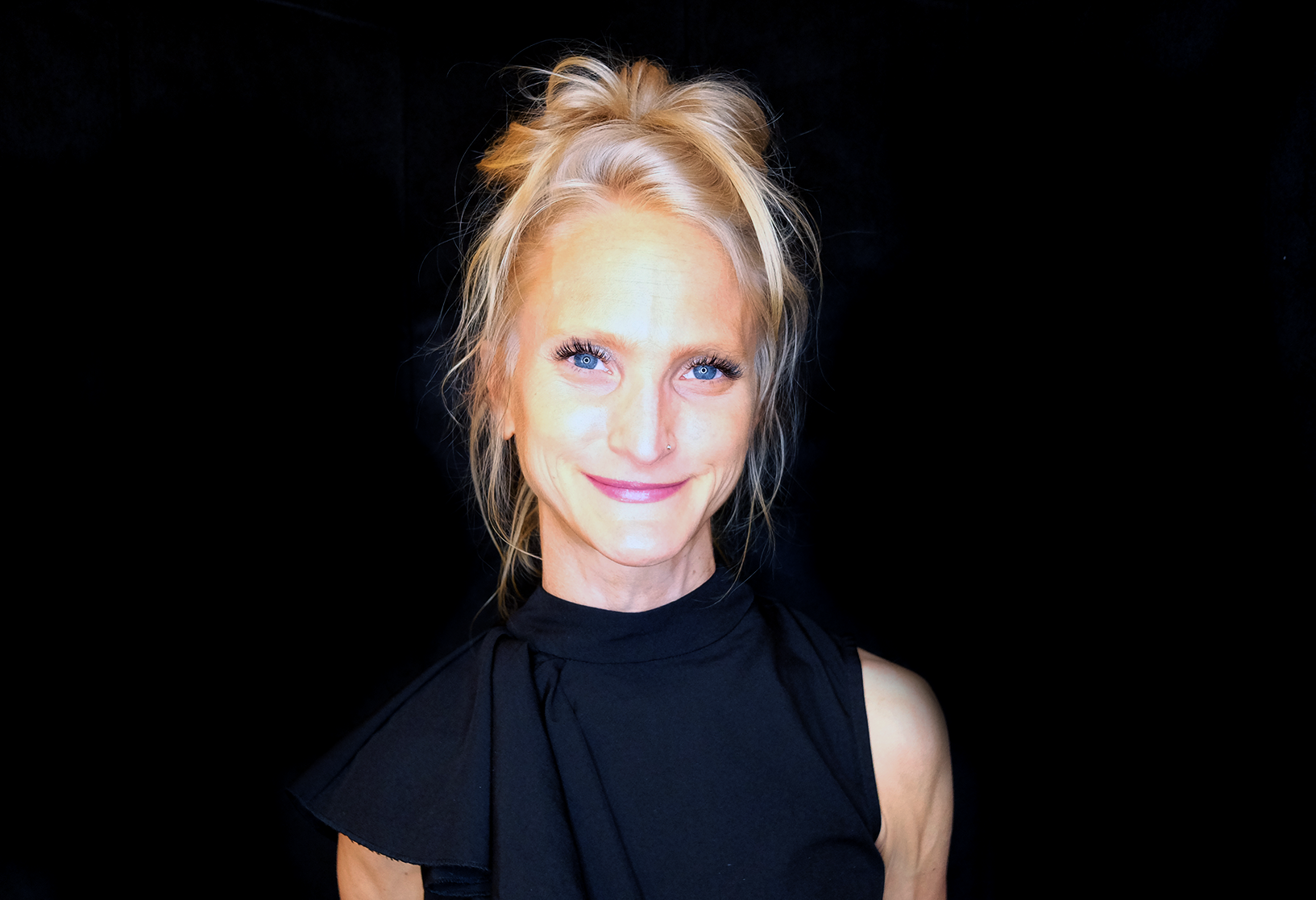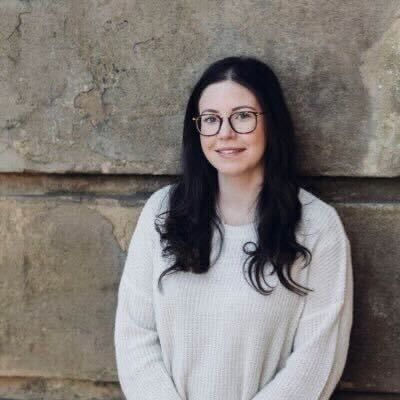How They Made It is an interview series that focuses on indie creators, exploring how they got their start and how their shows and practices have evolved since then. We hope you find inspiration in them for your own creative projects.
If there’s an indie creator who’s hit it big that you think we should feature, send an email to ashley@descript.com.
Chelsea Devantez has an impressive resume as a TV writer, with credits on shows like Girls5eva and The Problem with Jon Stewart under her belt. But her favorite creative project is her podcast, Celebrity Book Club (recently rebranded to Glamorous Trash), which does exactly what its name suggests: allows her audience to listen in on Chelsea and her funniest friends discussing books about the lives of the rich and famous.
We talked to Chelsea about how she used Instagram to create community conversations before her show even launched, why leaving a podcast network was the best decision she ever made, and how much she loves Descript. (What can we say, it’s a very good app.) This interview had been edited and condensed for length and clarity.

I want to start at the very beginning. How did you get the idea? And then how did you turn it from an idea into an actual show?
I have this text thread of friends; they’re all showrunners and head writers, a bunch of cool women. We were all trying to get together, and it took us two years to plan a trip. The date we found was Valentine's Day in 2020. And because we were all so tired, we're like, “We're going to go on a girl's trip, but everyone can nap at any time. It's a nap trip, too.”
I was in the hot tub. Everyone had gone to nap, and I started reading Jessica Simpson's memoir. And I was like, people have to know how good this book is.
Previously as a woman in comedy, I had hidden my love of this genre, because it's so looked down upon. But this was the moment I broke free and I started posting about it on my Instagram stories. And immediately all the messages were either like, “Oh my God, I love celebrity memoirs too, they are the best,” or “I can't believe celebrity memoirs are good in any way.” It became a podcast that night—literally, my manager has a drunken email from me being like, Happy Valentine's day, I think I have a podcast idea.
The pitch pages went out four days later, and it sold immediately. And then pandemic hit, and it took eight months to actually get them to launch my episode. And then a year later, I took it fully independent and left the network.
My biggest regret is taking it to a network, when I could have always done it myself. But because I was a working TV writer, I had thought, go through the system that is set up.
It was pandemic. So we never once recorded in person. I set up my whole recording studio. Every podcast was over Zoom. All the engineering was on Zoom. And then I've always had a really heavy hand in the edit. I haven't done the technical engineering, but I was doing all the creative paper cuts. I was with the network, but I made the logo. That kind of thing.
So then when you decided to take it independent, how did you do that? What did that look like?
Taking it independent was definitely very scary. At the time I was head writing The Problem with Jon Stewart. So there was a part of me that was like, I should just stop this. I should just not have a podcast anymore. The network I was with was very clearly falling apart, and no longer exists. So that was the moment where I was like, I need to take this independent, or I need to stop doing it.
I started a Patreon, and I put out an episode that was like, “If enough people join Patreon to pay for the production, I'll keep doing this podcast. And if they don't, probably goodbye forever.”
My manager Jordan introduced me to an independent producer, Kate Downey, who was like, I'll sign on. After that, me, Jordan, Kate, we had to take on all of the producing roles. I had to open a bank account. It was a ton of work, but the first big step was Patreon.
Kate is the one who introduced me to Descript. When I was with the network, we were working in Google Docs. But I go independent and we suddenly have Descript, which is so much better.
We’re not even paying you to say that! Tell me more about how Descript has become part of your process.
Kate puts together the script and does her first edit; then I'll go in and listen and put comments in. I love that you can speed it up. You can listen on double time. I also love that you can use it to pinpoint where you want videos to come from. It’s just such a great hub. The transcript part can be so hard, and take so long. And that's the part that they make easy.
What’s the rest of your tech setup at this point?
I record right here in my office. I have a RODECaster, which is great ‘cause I take it on the road with me when I'm traveling. And then I have a Shure mic that was sent to me in the pandemic to record something for TV, and I just kept it. We record over Zoom; we're probably switching to Riverside.
How did you talk to your listeners about money? How did you convey the stakes of getting them to contribute? Because people are used to getting things for free at this point.
The stakes were definitely the highest it could be: it was podcast, or no podcast.
I always really wanted it to be free, because I like listening to free stuff. I also come from a poor background, and I never ever wanted to ask for money. So I really tried to offer stuff, so it felt less like asking for money and more like, I'm going to give you a bit more.
I came up with more episodes to offer. I added people to my close friends list on Instagram; I do tons of Instagram content. I sent out copies of my actual books that had all my notes in them.
I don't know what other podcast communities are specifically like, but this one's really, really tight and close-knit. That also really helped.
How did you cultivate that kind of community? Because you’re right, that doesn’t happen for everyone.
It started on my Instagram, when I was posting these stories. A real digital book club started coming together before the podcast ever launched 'cause it took so long. So basically, I post book stuff, and I get tons of DMs responding to it. Then I would post the DMs, and people would respond to those DMs. So it was like, you're reading other people's thoughts. Other people are pitching in. Book clubs can't be based on one person. That has to be a group.
I think also, the really big theme of the podcast is sharing, especially as women, in order to make life better. The books share, but then you should share back. That’s a theme in the show, so it naturally translates to a theme in everyone's life, to want to share and talk.
I will say, when people ask me to quantify how much work I put into it, I don't want to. Because I think if I have to look at it in the light of day, I'll be like, this is impossible.
You come from a writing background. How much do you pre-plan your episodes?
The intro is scripted, and then I always have a really tight beat sheet. And I rewrite in editing. I know some podcasts don't do that; there is something beautiful to a natural, free flowing conversation. That's just not my style.
Listening to and loving other podcasts helped me to know what I liked. I loved the podcast that had energy, and told me what the episode was going to be about before the episode started.
I always go in with a lot of preparation and a lot of thinking, and then I let it flow. I learned this in my TV writing and improv career, too: prep always pays off.
Tell me more about how you construct your beat sheets.
When I am reading something—let’s say Jessica Simpson's book, and she has an ovary removed. And I think to myself, I had an ovarian tumor removed. So I'll make the note of, let's talk about her story. I'm probably going to share my ovarian story too. And then I will always put in a question for my guests on things I personally had a question about. So I'm reading it and I go like, wait, is John Mayer still friends with her parents? And then after I make the list, I’ll read through it, and if I feel scattered going through it, I'll reorganize and rearrange.
I also think people don't think often enough about clarity for listeners, so the beat sheet is the details and context that needs to be given to the listener so that they could enjoy anything that comes next. It’s so dorky to say this, but it's like ballet, you know what I mean? Where it looks like they're gliding, but oh, those bitches are suffering.
What advice do you have for a beginning podcaster?
I would advise them to start their social media before they record. And to make sure their social media is not an advertisement for the podcast, but actual engaging social media you would want to follow no matter what. Because if you are independent, you're in charge of your own marketing. And the only free marketing tool is social media.
And then my subjective advice is to keep it sharp, keep it tight, keep it interesting. From the moment the podcast starts, give me a show. There are times I will listen to a podcast for a minute and be like, this one's probably not for me.
Do not join a network, ever, until they come to you with tons of money. You can do it all independently so easily. Be your own producer.






%20(1).JPG)

























